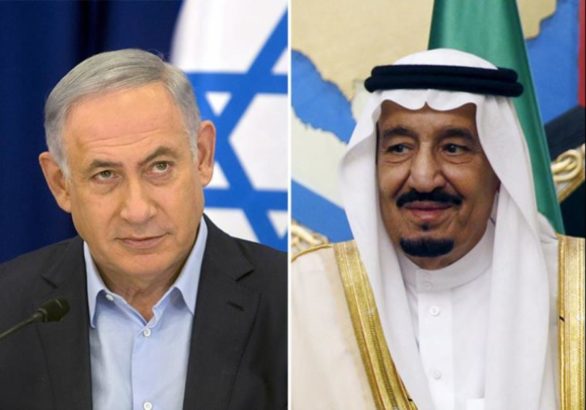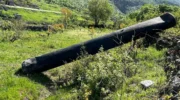Israeli Prime Minister Benjamin Netanyahu, Saudi Crown Prince Mohamed bin Salman
A leaked cable indicates that Israel is working behind the scenes to support Saudi actions against Lebanon, Iran, Hezbollah, and Yemen. (Israel has long favored regional fragmentation.) An analyst says, “Israel is becoming the unlikely leader of the Sunni world.” Meanwhile, the recent resignation of Lebanese Prime Minister Hariri seems to have been scripted…
Jonathan Cook, Aljazeera, Nov. 10
Israel has instructed its overseas embassies to lobby their respective host countries in support of Saudi Arabia and its apparent efforts to destabilise Lebanon, a recently leaked diplomatic cable shows.
The cable appears to be the first formal confirmation of rumours that Israel and Saudi Arabia are colluding to stoke tensions in the region.
Sent by the Israeli foreign ministry and disclosed by Israel’s Channel 10 news this week, the cable demanded that diplomats stress Iran and Hezbollah’s engagement in “regional subversion”.
That closely echoes accusations Riyadh levelled against Tehran and the Lebanese faction in recent days.
Analysts have noted that diplomatic moves by Israel to intervene directly in a seemingly internal Arab matter are “very rare”.
Yossi Alpher, a former adviser to Ehud Barak when he was Israeli prime minister, called the cable “extremely presumptuous”.
“Do the Saudis really need Israel to put in a good word for them in capitals around the world?” he told Al Jazeera.
But others believe Benjamin Netanyahu, the Israeli prime minister, who also heads the foreign ministry that issued the cable, may be looking to gain from an uptick in uncertainty in the region.
War of words
The cable comes as Saudi Arabia has dramatically escalated its rhetoric against Iran and Hezbollah.
On Thursday, the Saudi foreign ministry told its nationals to leave Lebanon immediately after it accused Hezbollah earlier in the week of “declaring war” on the kingdom.
That followed the resignation of Saad Hariri as Lebanon’s prime minister. A politician with close personal and business ties to Saudi Arabia, Hariri announced his departure while in Riyadh. [Video below]
He accused Iran of building “a state within a state” in Lebanon through Hezbollah, a Lebanese Shia group which is represented in the parliament and has a strong military wing.
There are widespread suspicions that Riyadh ordered Hariri to step down as a way to destablise Lebanon, whose complex and fragile political set-up has struggled to contain sharp sectarian divisions.
[Reuters reports that Lebanese President Michel Aoun said that Saudi Arabia had kidnapped Hariri. Hariri’s resignation statement seems to have been scripted – see article below.]
Saudi Arabia has also implicated Hezbollah in the launching of what it says was an Iranian-made rocket from Yemen that was intercepted over Riyadh.
Saudi Arabia has been waging a war in Yemen against the Houthis, a Shia minority, and has accused Iran of fomenting and supporting the Houthis.
The diplomatic cable
The leaked cable instructed Israeli diplomats “to stress that the Hariri resignation shows how dangerous Iran and Hezbollah are for Lebanon’s security”.
The diplomats were told to appeal to the “highest officials” in their host countries to press for Hezbollah’s expulsion from the Lebanese government. “Hariri’s resignation proves wrong the argument that Hezbollah participation in the government stabilises Lebanon,” the cable said.
It further called on Israeli diplomats to back Saudi Arabia in its war in Yemen, emphasising that the missile directed at Riyadh required “more pressure on Iran and Hezbollah”.
Menachem Klein, a politics professor at Bar Ilan University, near Tel Aviv, said that it was likely Netanyahu expected and wanted the cable to go public.
“If you send a diplomatic cable and start lobbying every foreign capital, you have to expect that it won’t remain private for long,” he told Al Jazeera.
“Netanyahu’s aim was to make clear to the Saudis that he can help. The message is, ‘We have special relations with Western countries and we can help you advance your political goals against Iran and Hezbollah, which we share’.”
Risking confrontation
But some say Israel risks being jostled by Saudi Arabia into an unnecessary and dangerous confrontation with Hezbollah as the result of what Israeli commentator Amos Harel this week described as Riyadh’s “ambitious attempt to reach a new regional order”.
In a column in Israeli daily Haaretz this week, Daniel Shapiro, a former US ambassador to Israel, argued that the Saudis were trying to move the battlefield from Syria to Lebanon after their failure to topple Syrian President Bashar al-Assad.
A six-year civil war there has dragged in a range of proxies.
Both Israel and Saudi Arabia have meddled in different ways in Syria during the war, with the barely concealed intention of weakening the Assad government and assisting rebel forces dominated by the Islamic State of Iraq and the Levant group (ISIL) and al-Qaeda affiliates.
However with Russian help, Assad has shored up his rule across much of the country in recent months, and the last major strongholds of the rebel groups have collapsed.
Neither Israel nor Saudi Arabia can afford to get more directly involved in Syria, given Russia’s involvement.
Shapiro warned Israel to be wary of Riyadh’s efforts to push it prematurely into a confrontation with Hezbollah, which could rapidly escalate into a regional war.
Threat to nuclear accord
A diplomatic source with long experience in the Middle East said the cable might ultimately prove to be just such a misstep.
“The Israelis will certainly be listened to because they have the best military intelligence in the region,” said the source, speaking to Al Jazeera on condition of anonymity.
“Europe, in particular, is very concerned about the growing numbers of refugees coming their way from the region, many of them through Lebanon. Any information Israel provides about changes to the delicate balance of power in Lebanon, or the likelihood of a war, will ring alarm bells.”
The source said Israel would be hoping to capitalise on these concerns by persuading European countries to toughen their stance towards Iran, especially in relation to the Iranian nuclear accord.
Signed between Iran and the P5 1 countries, the deal led to the loosening of Western diplomatic sanctions on the Iranian regime two years ago.
“Both Israel and the Saudis want to see the nuclear deal collapse, but Israel is better placed than Riyadh to demonise Iran,” said the source.
Lebanon vulnerable to Israeli agression?
Analysts have suggested that renewed sectarian conflict in Lebanon – a possible outcome of Hariri’s resignation – could also leave it more vulnerable to Israeli aggression.
In September, in a sign that Israel may be preparing for a confrontation on its northern border, the Israeli army held its biggest military drill in 20 years, simulating an invasion of Lebanon.
Hezbollah, however, is widely assumed to be armed with tens of thousands of rockets and missiles. So far, that has acted as a deterrent to a repeat of Israel’s bombardment and invasion of Lebanon in 2006.
Still, Israel and Saudi Arabia appear interested in cementing their alliance and shifting attention towards Lebanon – and away from Syria.
Israel’s 100 airstrikes on Syrian Government, aid to Islamist fighters
Israel has launched more than 100 air strikes on Syrian government and military targets in recent years, according to Reuters news agency estimates, largely on the grounds that it was preventing the transfer of weapons technology from Iran to Hezbollah.
A field hospital established by the Israeli army in the Israeli-occupied Syrian Golan Heights has treated wounded Islamist fighters and returned them to Syria, the UN has documented.
The UN has also observed the Israeli army passing “boxes” to Islamist fighters that were widely assumed to contain weapons.
Noam Sheizaf, an Israeli journalist, noted that Israel has become increasingly open about its attacks in Syria, taking responsibility for them to a degree not seen before.
“The risk of escalation lies in the fact that everyone wants someone else to fight Iran for them. Israel wants the US to do it, while the Saudis want Israel to attack Iran or proxies like Hezbollah,” he said.
Israeli ‘Coalition-building’
Sheizaf told Al Jazeera the cable appears to be “part of Israeli efforts at coalition-building with Saudi Arabia and most of the Gulf states”.
He said: “Israel understands that the Saudis lost to Iran in Syria and Yemen, and now they need an ally with the military and diplomatic power that Israel can provide.”
Netanyahu indicated as much in recent comments when he said Israel was working “very hard” to establish an alliance with “modern Sunni states” to counter Iran.
Jeff Halper, an Israeli analyst, suggested that Israel had even grander ambitions.
“As strange this sounds, the cable shows how Israel is becoming the unlikely leader of the Sunni world,” he told Al Jazeera.
“Saudi Arabia has found it can’t even defeat the Houthi rebels in Yemen. It needs the things Israel can offer – Israel’s military might, its legitimacy in Europe and the US, its influence in the US Congress. Israel has the kind of clout internationally the Saudis want but simply don’t have.”
Saad Hariri’s resignation as Prime Minister of Lebanon is not all it seems
By Robert Fisk, Independent, Nov. 9
He certainly did not anticipate what happened to him. Indeed, Hariri had scheduled meetings in Beirut on the following Monday – with the IMF, the World Bank and a series of discussions on water quality improvement; not exactly the action of a man who planned to resign his premiership. (Video below)
When Saad Hariri’s jet touched down at Riyadh on the evening of 3 November, the first thing he saw was a group of Saudi policemen surrounding the plane. When they came aboard, they confiscated his mobile phone and those of his bodyguards. Thus was Lebanon’s prime minister silenced.
It was a dramatic moment in tune with the soap-box drama played out across Saudi Arabia this past week: the house arrest of 11 princes – including the immensely wealthy Alwaleed bin Talal – and four ministers and scores of other former government lackeys, not to mention the freezing of up to 1,700 bank accounts. Crown Prince Mohamed bin Salman’s “Night of the Long Knives” did indeed begin at night, only hours after Hariri’s arrival in Riyadh. So what on earth is the crown prince up to?
Put bluntly, he is clawing down all his rivals and – so the Lebanese fear – trying to destroy the government in Beirut, force the Shia Hezbollah out of the cabinet and restart a civil war in Lebanon. It won’t work, for the Lebanese – while not as rich – are a lot smarter than the Saudis. Every political group in the country, including Hezbollah, are demanding one thing only: Hariri must come back. As for Saudi Arabia, those who said that the Arab revolution will one day reach Riyadh – not with a minority Shia rising, but with a war inside the Sunni Wahhabi royal family – are watching the events of the past week with both shock and awe.
But back to Hariri. On Friday 3 November, he was in a cabinet meeting in Beirut. Then he received a call, asking him to see King Salman of Saudi Arabia. Hariri, who like his assassinated father Rafiq, holds Saudi as well as Lebanese citizenship, set off at once. You do not turn down a king, even if you saw him a few days’ earlier, as Hariri had. And especially when the kingdom owes Hariri’s “Oger” company as much as $9bn, for such is the commonly rumoured state of affairs in what we now call “cash-strapped Saudi Arabia”.
Hariri’s scripted resignation statement
But more extraordinary matters were to come. Out of the blue and to the total shock of Lebanese ministers, Hariri, reading from a written text, announced on Saturday on the Arabia television channel – readers can guess which Gulf kingdom owns it – that he was resigning as prime minister of Lebanon. There were threats against his life, he said – though this was news to the security services in Beirut – and Hezbollah should be disarmed and wherever Iran interfered in the Middle East, there was chaos.
Quite apart from the fact that Hezbollah cannot be disarmed without another civil war – is the Lebanese army supposed to attack them when Shia are the largest minority in the country (many of them in the army)? These were not words that Hariri had ever used before. They were not, in other words, written by him. As one who knows him well said this week, “this was not him speaking”. In other words, the Saudis had ordered the prime minister of Lebanon to resign and to read his own departure out loud from Riyadh.
I should add, of course, that Hariri’s wife and family are in Riyadh, so even if he did return to Beirut, there would be hostages left behind. Thus after a week of this outrageous political farce, there is even talk in Beirut of asking Saad Hariri’s elder brother Bahaa to take his seat in the cabinet. But what of Saad himself? Callers have reached him at his Riyadh home, but he speaks only a few words. “He says ‘I will come back’ or ‘I’m fine’, that’s all, only those words, which is very unlike him,” says one who must know. And what if Hariri did come back? Would he claim that his resignation had been forced upon him? Dare the Saudis risk this?
He certainly did not anticipate what happened to him. Indeed, Hariri had scheduled meetings in Beirut on the following Monday – with the IMF, the World Bank and a series of discussions on water quality improvement; not exactly the action of a man who planned to resign his premiership. However, the words he read out – scripted for him – are entirely in line with the speeches of Crown Prince Mohamed bin Salman and with the insane President of the United States who speaks of Iran with the same anger, as does the American Defence Secretary.
Bin Salman’s coup
Of course, the real story is just what is going on in Saudi Arabia itself, for the crown prince has broken forever the great compromise that exists in the kingdom: between the royal family and the clergy, and between the tribes. This was always the bedrock upon which the country stood or fell. And Mohamed bin Salman has now broken this apart. He is liquidating his enemies – the arrests, needless to say, are supposedly part of an “anti-corruption drive”, a device which Arab dictators have always used when destroying their political opponents.
There will be no complaints from Washington or London, whose desire to share in the divvying up of Saudi Aramco (another of the crown prince’s projects) will smother any thoughts of protest or warning. And given the smarmy reporting of the Crown Prince’s recent speeches in the New York Times, I have my suspicions that even this elderly journalistic organ will be comparatively unworried by the Saudi coup d’etat. For that is what it is. He unseated the interior minister earlier this year and now Mohamed bin Salman is getting rid of his opponents’ financial power.
But ruthless men can also be humble. Hariri was allowed to see the King – the original reason for which he believed he was travelling to Riyadh – and even paid a visit to the crown prince of the United Arab Emirates this week, an ally-nation of the Saudis who would prevent him jumping on a flight to Beirut. But why on earth would Hariri want to go to the Emirates? To prove that he was still free to travel when he cannot even return to the country which he is supposed to be ruling?
Lebanon is always going through the greatest crisis since its last greatest crisis. But this time, it’s for real.
Hariri’s resignation statement:





